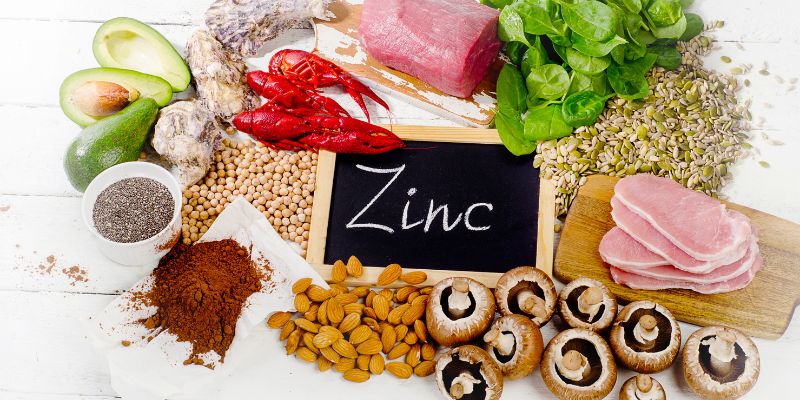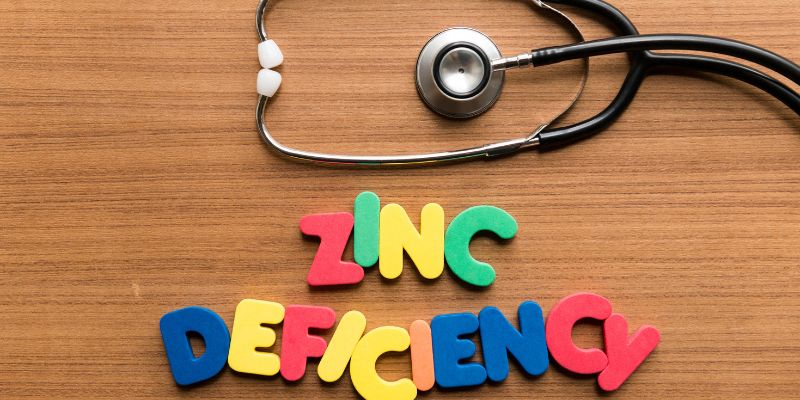Know About Zinc Deficiency Symptoms, Causes, Risk Factors and More
Nov 20, 2023 By Nancy Miller
Our body needs various minerals to function properly, including zinc. It is an essential mineral that fights against infections, heals injuries, synthesizes DNA, produces cells, and boosts the immune system.
Though the body does not need a lot of zinc, there is still a chance of zinc deficiency as our bodies cannot produce zinc. So, if you are not getting enough zinc in your diet or suffering from any chronic condition, you may face various symptoms, including hair loss, loss of taste, or a weak immune system.
If you suffer from these symptoms and want to know the causes of zinc deficiency and its risk factors, you have reached the right place. Continue to read and find answers to all of your queries.

What Are The Symptoms Of Zinc Deficiency?
Below are the crystal clear signs of zinc deficiency:
Hair Loss
If you don’t get enough zinc from food or supplements, your hair might start to get thin, and not having enough iron and zinc can lead to hair loss. But thinning hair does not always mean a mineral shortage. Stress, hormones, genetics, and other things can make your hair fall out. If unsure why you are losing hair, you should talk to your doctor.
Weaken Your Immune System
Zinc is crucial for keeping you healthy; if you don’t have enough, your immune system will weaken, and you will likely get sick. Take zinc supplements and eat nutritious foods to boost your immune system. Fixing nutrient gaps helps your immune system work well. If you keep getting sick a lot, it could be a sign of a bigger health problem, and it is a good idea to talk to your doctor.
Gastrointestinal Problems
If you often have tummy troubles like diarrhea, it is suggested to consult your doctor before thinking it is a zinc deficiency causing the issue. Many things can mess with your digestion, so it is not safe to assume it is just a zinc deficiency. Your doctor can check your symptoms and figure out what’s going on and causing your frequent stomach problems.
Changes in Appetite
If you feel like eating little, your body might need more zinc. It can be tricky to figure out because not wanting to eat is a symptom of different health issues.
Even though zinc deficiency might not be the main reason you are not hungry, it is still something to consider if you have lost weight or don’t have much appetite. These could be signs of a bigger problem linked to insufficient zinc.
What Are The Causes Of Zinc Deficiency?
Around 1.1 billion people worldwide lack enough zinc in their bodies because of:
- Not eating the right foods
- Losing too much zinc
- Having chronic health issues
People suffering from given chronic conditions can face zinc deficiency:
- Chronic diarrhea
- Kidney and liver diseases
- Crohn’s disease
- Diabetes
- Pancreatic disease
- Cancer
- Celiac disease
- Sickle cell disease
- Ulcerative colitis
How is Zinc Deficiency Diagnosed?
Zinc deficiency is tricky to spot because its symptoms are vague and similar to other health issues. Things like infections, anemia, and thyroid problems can show similar signs. There is no standard blood test for checking the low zinc, which makes diagnosis challenging.
Your doctor needs details about your diet, health history, and medications to determine zinc deficiency. The doctor can diagnose zinc deficiency using this info and checking for symptoms. Blood tests can help, too, showing zinc levels and other issues like anemia.
Risk Factors Of Zinc Deficiency
If you are worried about insufficient zinc, you might think, “Should I take zinc supplements?” People with certain health problems are more likely to have a zinc deficiency:
- Rheumatoid Arthritis: People with rheumatoid arthritis may not absorb as much zinc, so they might need to take supplements to keep enough in their bodies.
- HIV (Human Immunodeficiency Virus)/Aids: People with HIV and AIDS must be careful when taking zinc supplements. Otherwise, it can shorten their lifespan.
- Nutrient Absorption Syndrome: Some people have problems absorbing nutrients, which can make them more likely not to have enough zinc.
- Diabetes: People with diabetes need to be careful with zinc supplements because taking too much can make their blood sugar drop dangerously low.
- Hemodialysis: If you are getting hemodialysis, there is a risk of insufficient zinc. You should take zinc supplements to make up for it.
Treating The Zinc Deficiency
You can treat the zinc deficiency by changing your diet and taking zinc supplements.
Supplements
Take zinc supplements or multivitamins to fulfill the zinc deficiency. Avoid cold medicine unless you are sick. Only use zinc supplements when you are not taking any other medication. If you take extra zinc through supplements, be cautious, as zinc might not get along well with certain antibiotics, arthritis medications, and diuretics.
Diet Changes
You can treat zinc deficiency by changing your diet and trying to add the following to your diet:
- Wheat germ
- Wild rice
- Oysters
- Red meat
- Poultry
- Seeds
If you don’t eat meat, like if you are a vegetarian, it might be harder to get the right amount of zinc from your food. In that case, you can try cashews, peas, baked beans, and almonds as other sources of zinc.
Conclusion:
Zinc is naturally found in many foods, and you rarely develop zinc deficiency. But, kids and adults who are suffering from certain conditions or are on restrictive diets usually suffer from zinc. Consequently, they suffer from skin rashes, hair loss, and colds (due to weak immunity).
If you suffer from zinc deficiency, developing the symptoms will take months to years. But, as soon as you witness any of the symptoms, contact the doctor and start taking zinc supplements or add zinc-rich foods to your diet.
-
 Condition Jan 04, 2024
Condition Jan 04, 2024What is Back Labor
Experiencing back labour during pregnancy can be a strange and unpleasant experience. Learn about what it is, the symptoms, and ways to relieve the pain so you're prepared for delivery day!
-
 Fitness Nov 21, 2023
Fitness Nov 21, 2023Exploring the Benefits of a Juice Cleanse
Discover the objective and possible advantages of a juice cleanse, a popular health practise that involves drinking fresh juices for a specific time.
-
 Condition Oct 10, 2023
Condition Oct 10, 2023Folic Acid: A Complete Guide
We'll explain this essential nutrient's dosage, its importance in pregnancy, and its benefits for men. Read on to understand this essential vitamin.
-
 Fitness Oct 10, 2023
Fitness Oct 10, 2023The Essential Role of Endorphins in Our Bodies
Learn about the role and primary functions of endorphins and the Influence of External Stimuli on Endorphin Levels in this read.

